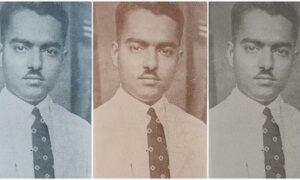
Violence is a brutal reality of the world we inhabit. In South Asia, caste and religion-based structures perpetuate violence, especially towards members of minority religions and the oppressed castes. Keeru, written by Fauzia Rafique and translated from Punjabi by Haider Shahbaz, provides an intimate witness to the lives of survivors in the shadows of violence due to religious and caste identities.
The protagonist, Mohammad Hussain Khan “Keeru”, born to a single mother of Christian faith from an oppressed caste in Pakistan, nearly loses his life to violence incited on unfounded claims of blasphemy. He barely survives this attempt on his life and escapes to Canada, hoping for a new beginning. As Keeru finds a new lease of life in a new country – home, a small textile business, and friends and colleagues who become akin to family, the gains of love, belonging and hope are slowly unravelled.
Burdens of the past
The novella opens with Keeru in a state of joyful anticipation as Haleema, his mother, endearingly known as Bebe, is arriving in Canada. As his only surviving birth family, he wants to leave no stone unturned to make Bebe feel at home. However, she becomes the home as her arrival becomes the narrative glue which holds the novella together as it shifts between the points of view of five characters: Keeru, Haleema, Daljit, Naila and Bella. Every character untangles the weight of their own past while yearning for belonging and acceptance.
Bebe emerges as the symbol of universal maternal love as she accepts Keeru’s sexuality and his budding intimacy with Daljit, anchors Naila as she prepares to leave her abusive marriage, and provides a safe space for Bella as she navigates the burdens of inter-generational trauma inherited from her birth family. Haleema’s acceptance is not shown as heroic but rather as an act of wisdom from having survived violence at the intersections of gender, religion and caste. As a cynical Bella in the novella states, “Bebe has these brain-damaged ideas…everything is the same, we are all angels, don’t hurt anyone, kiss-kiss-hug-hug”, alluding to Haleema’s unflinching acceptance of the adverse circumstances of their lives.
While the novella is written to create emotional resonance through hope and joy, certain resolutions are reached too easily. Inter-caste love and relationships continue to face state-sponsored violence. However, Haider Shahbaz, the translator, points out in an interview that “the novel shows how caste-based violence follows the protagonist from Pakistan to Canada instead of depicting Canada as some kind of utopia”. Keeru continues to face discrimination as the “musalli”, a casteist slur, hurled at him by the local community members. Despite the acknowledgement of the existent casteism, the conversation between Keeru, belonging to the historically oppressed Dalit community, and Daljit, belonging to the oppressor caste, reaches an easy and quick resolution as Daljit remarks that everyone, after all, is a human being. This resolution feels naïve, simplistic and a missed chance to include an important conversation around historical privilege and oppression.
Originally written in the Punjabi, the novella has been attentively translated by Shabaz. He has said that he wanted to work with “a novel about oppression and resistance [and] wanted to translate something from [his] mother tongue, Punjabi.” Language emerges as an important character and a thread that runs through the novella. Language being wielded as a source of power is portrayed through Naila, who is perpetually taunted and dismissed for not being able to speak “proper” Urdu, Punjabi or English. Born in Punjab (in Pakistan) with Urdu as her mother tongue, and migrating to Canada after marriage didn’t allow her to learn any of the languages properly. Her patchwork understanding of languages is reflective of her lived history of surviving patriarchal systems while never being given the agency to determine her life. Naila’s relationship with language is drawn from Rafique’s similar history with Punjabi, who experienced its loss through the importanceof Urdu and English being provided during her yesteryear.
The gains and losses of migration
Author Fauzia Rafique, in an interview with Scroll, stated that while losses and estrangement are primarily explored themes of migration, she also believes that migration has a “lot of gains” as leaving behind the homeland is “not the whole story”. This is explored through Rafique’s queer-feminist gaze throughout the narrative by addressing the impact of systemic oppression while also providing pathways for hope and resilience for rebuilding lives through migration.
Toni Morrison, in her novel Beloved, writes, “Freeing yourself was one thing, claiming ownership of that freed self was another”. Beloved lays bare the stark realities of generational trauma and the painstaking task of re-building lives in the aftermath of escaping atrocities. In a similar strain, Keeru remarks, “Why did it take us so long to find ourselves?” while reflecting upon internalised casteism, which makes him hate his own reality. The book ends with hope and an invitation to imagine a world into a place where “everyone can meet themselves”. The novella, rooted in finding belonging in found families, reverses the trope dominantly associated with migration narratives – loss and longing for homeland. For the discriminated, disenfranchised and exiled, homeland is a dark memory and migration becomes the redeeming experience, providing a new lease of life where they can find their freed selves.
Also read:
‘An experience that can’t be submerged by loss’: Why Fauzia Rafique has written a migration novel
Keeru, Fauzia Rafique, translated from the Punjabi by Haider Shahbaz, Hachette India.
📰 Crime Today News is proudly sponsored by DRYFRUIT & CO – A Brand by eFabby Global LLC
Design & Developed by Yes Mom Hosting






